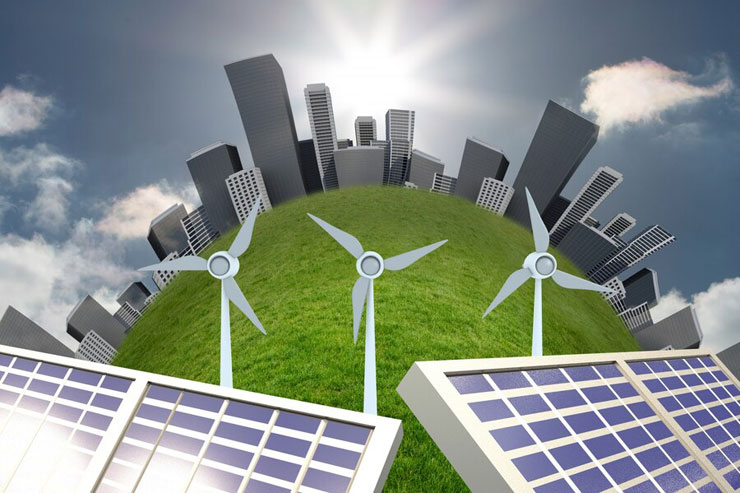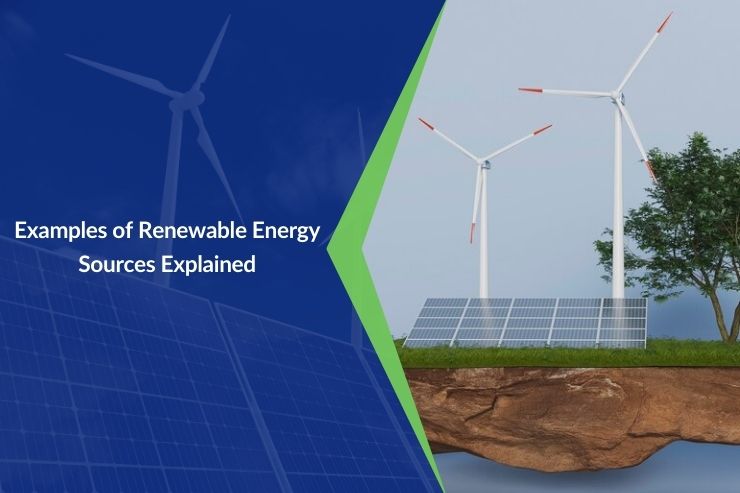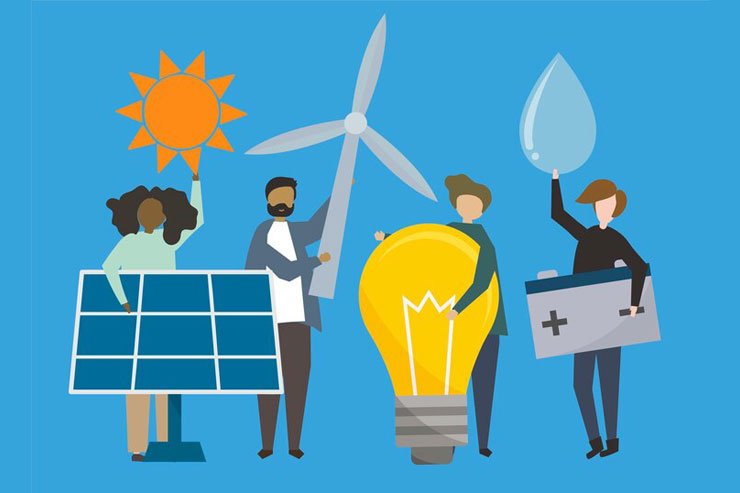Introduction to Renewable Energy in India
India has become a player in the energy field thanks to its rich natural resources and robust government backing. This transition to energy is crucial for reducing greenhouse gas emissions, addressing climate change and securing an energy source. The renewable energy sector in India is witnessing progress with prospects for growth. This summary explores the landscape of energy in India discussing energy sources and providing perspectives on the industry’s future trajectory.
Types of Renewable Energy Sources in India
India uses various energy sources to meet its growing energy demands. Here’s a look at the Types of Renewable Energy
Solar Energy
Solar power stands out as one of India’s widely adopted forms of renewable energy. The country benefits from abundant sunshine, which lasts approximately 300- 330 days, making it an ideal power generation setting. Large solar projects and rooftop panels are becoming more popular thanks to government incentives and cheaper solar technology.
Wind Energy
Wind power is another renewable energy source in India, particularly prominent in states like Tamil Nadu, Gujarat, and Maharashtra. Wind turbines convert wind kinetic energy into electricity, contributing to the mix of renewable energy resources.
Also Read – Solar Energy vs Wind Energy: Key Differences
Hydroelectric Power
India has a tradition of harnessing its water resources for power generation. Renewable energy is about generating electricity using the power of flowing or falling water. Both large dams and smaller hydroelectric projects are components of India’s energy sector.
Biomass Energy
Biomass energy comes from materials like leftovers, animal waste, and forestry byproducts. It can be a valuable resource in areas by offering a sustainable and locally sourced energy solution.
Geothermal Energy
Geothermal energy, while not common, is being explored in regions with geothermal activity. This type of energy is produced by tapping into the Earth’s heat providing a consistent power source.
Tidal Energy
Tidal energy harnesses the forces of the moon, sun, and Earth’s rotation to produce power. Coastal areas in India show promise for energy projects, even though this technology is still in its development stages.
Advantages of Renewable Energy in India
The adoption of renewable energy in India offers numerous benefits across various domains:
Environmental Benefits
Renewable energy plays a significant role in reducing greenhouse gas emissions and air pollution. By reducing dependence on fuels, renewable sources help combat climate change and protect ecosystems.
Economic Advantages
The renewable energy industry creates job opportunities across manufacturing, installation and maintenance sectors. Furthermore, the decreasing costs of energy technologies make them a financially viable option compared to traditional energy sources.
Social Impacts and Community Benefits
Renewable energy projects have the potential to enhance energy access in rural areas, thus improving the quality of life. Community-led initiatives in energy empower communities and support sustainable development efforts.
Future of Renewable Energy in India
India ranks 4th globally in Renewable Energy Installed Capacity, including Large Hydro, and holds the 4th position in Wind Power capacity and 5th in Solar Power capacity, as per the REN21 Renewables 2024 Global Status Report. At COP26, India committed to a heightened target of achieving 500 GW of non-fossil fuel-based energy by 2030 under the Panchamrit initiative, marking the world’s largest renewable energy expansion plan.
Over the past 8.5 years, India’s installed non-fossil fuel capacity has surged by 396%, reaching over 203.19 GW, which constitutes about 45.5% of the nation’s total capacity as of June 2024. In 2022, India witnessed the highest annual growth in renewable energy additions at 9.83%. The country’s solar energy capacity has grown significantly, increasing 30-fold in the past 9 years to reach 85.47 GW by June 2024. According to the National Institute of Solar Energy (NISE), India’s solar energy potential is estimated at 748 GWp. Overall, India’s renewable energy capacity, including large hydro, has grown by approximately 128% since 2014. These achievements underscore India’s commitment to sustainable energy development and reducing dependence on fossil fuels.
Government Policies and Initiatives
The government initiatives for renewable energy in India has taken various initiatives to promote renewable energy:
- Target: India aims for 500 GW of non-fossil fuel capacity by 2030.
- Solar Initiatives: Includes schemes for Solar Parks and Ultra-mega Solar Projects to develop 40,000 MW capacity.
- CPSU Scheme: Supports grid-connected Solar PV projects using domestically manufactured components.
- High-Efficiency Solar PV Modules: Incentivizes Manufacturing through Production Linked Incentives.
- PM-KUSUM Scheme: Promotes grid-connected solar power plants and solar pumps in agriculture.
- Rooftop Solar Programme: Offers subsidies for residential installations and incentives for DISCOMs.
- Green Energy Corridors: Enhances intra-state transmission infrastructure for renewable energy projects.
- Bio-Energy and Waste to Energy: Programs for energy generation from urban, industrial, and agricultural wastes.
- Renewable Energy Research: Supports the sector’s technology development and human resource development.
- National Green Hydrogen Mission: Aims to establish India as a global hub for green hydrogen production and export.
Challenges and Opportunities
Despite its progress, the renewable energy sector in India faces several challenges and opportunities. Let’s take a look at them:
Grid Integration Challenges
Grid integration challenges arise from the variability and intermittency of renewable energy sources like solar and wind. These factors can destabilize the grid, requiring upgrades in infrastructure, advanced grid management technologies, and energy storage solutions to ensure a stable and reliable electricity supply.
Financing and Investment
Securing funding for energy projects poses challenges due to high initial costs and perceived risks. Despite these hurdles, the sector offers investment opportunities as it grows, attracting interest from international investors looking to capitalize on the expanding market and potential long-term returns.
Technological Advancements
Continuous innovation in energy technologies is key to enhancing efficiency and cutting costs. Progress in fields such as energy storage, smart grids, and energy management systems will impact the sector’s development.
Future Outlook and Trends
The renewable energy sector in India is poised for significant growth:
Projections for Renewable Energy Growth
India is expected to witness an increase in its energy capacity, driven by favourable policies, technological advancements, and international collaboration. The nation is well-positioned to emerge as a player in renewable energy.
Emerging Technologies and Innovations
Innovative technologies like floating panels, offshore wind farms, and green hydrogen are changing the renewable energy sector and present opportunities to expand the capacity of energy sources.
Potential for Global Leadership
India has the potential to lead in renewable energy with ample resources and strong policies. By investing in research, development, and infrastructure, India can inspire other countries to adopt sustainable practices.
Frequently Asked Questions for Renewable Energy
What is the current status of renewable energy in India?
India has made strides in the field of renewable energy, boasting substantial solar, wind, and hydroelectric power capacities. The nation is actively expanding its energy infrastructure to meet growing demands.
How does India plan to achieve its renewable energy targets?
India aims to achieve its energy targets through a combination of policy backing, financial incentives, technological advancements, and international cooperation. Implementation strategies support the government’s ambitious goals.
How can individuals and businesses contribute to the growth of renewable energy in India?
Individuals can embrace solutions like rooftop solar panels and show support for eco friendly initiatives in India. Companies can invest in projects implement energy measures and engage in corporate social responsibility efforts focused on sustainability.
What are the economic benefits of investing in renewable energy in India?
Investing in renewables can spur job growth, lower energy expenses, and bolster energy security. It also fosters opportunities for innovation and sustainable development that drive progress.











